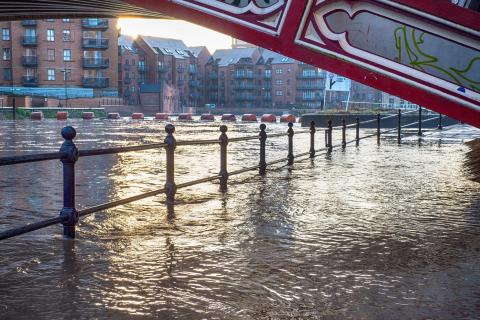This project aims to assist Leeds City Council’s Flood Risk Management team in developing a stronger leadership role on climate resilience and adaptation planning, through a collective re-examination of existing roles, relationships and working partnerships, in response to the Yorkshire and Humber Climate Commission’s Climate Action Plan.
Background
It is widely acknowledged that swifter progress is being made on mitigating carbon emissions (net-zero planning) than on adaptation to a changing climate. One reason for this may be a relative lack of clarity about whose role it is to lead on climate resilience. For example, within Leeds City Council, Flood Risk Management is the office with the clearest brief to plan for extreme weather events. Yet this team’s responsibilities are focused only on flooding, rather than other, related areas of climate threat, and they are tasked with addressing specific risk factors, not with promoting resilience capacity in the wider population.
If Leeds’s Flood Risk Management team are to act as “resilience champions” for the city, significant changes may be required in everyday working practices, and in modes of interaction with partner organisations and the general public. The challenge of climate resilience throws existing roles and responsibilities into question. This project will serve as a case study in exploring these issues, and findings will be shared with other partners across Yorkshire and beyond.
Partnership
This project will partner Stephen Scott-Bottoms from the University of Manchester with Leeds City Council’s Flood Risk Management team. Acting as an independent broker, listening responsively to the team’s concerns and ideas, Stephen will lead a collective re-examination of the Council’s preparedness to act on climate resilience and adaptation planning. How might existing roles and relationships need to be adjusted? What new skills might need to be inculcated? What kinds of interaction might be needed with other role-players, elsewhere, to promote more effective climate resilience?
Outputs
- Project report – A summary report presenting the project’s findings and recommendations will be published by Leeds City Council and disseminated to partner organisations in the Yorkshire and Humber Climate Commission and beyond.
- Public performance – Stephen will use his storytelling expertise to develop an engaging and easily portable public performance, exploring some of the challenges faced by ordinary people in adapting to climate risks. This will function as a tool to promote further dialogue on these questions in community and organisational settings.
- Community engagement – Stephen will assist Leeds’ Flood Risk Management team in developing a pilot community engagement initiative in an area that faces resilience challenges but is not necessarily at immediate flood risk. It is anticipated that this may lead to a larger follow-on project in future.

